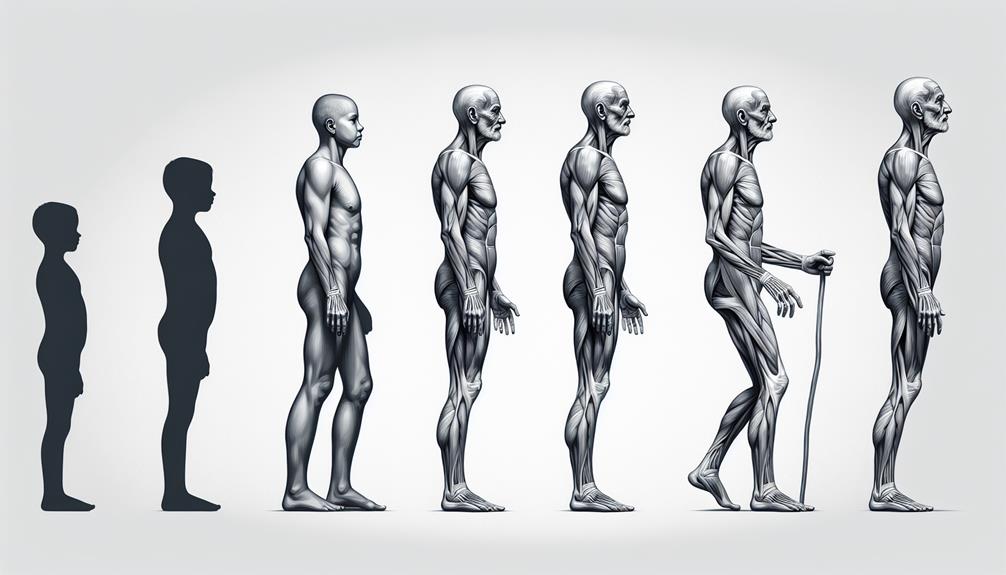
To understand common health conditions in aging adults, focus on heart disease, arthritis, cognitive decline, osteoporosis, diabetes, vision, hearing issues, and chronic pain. Prioritize a diet low in fats, cholesterol, and sodium, plus exercise for joint health. Recognize cognitive decline symptoms and seek medical advice. Increase calcium intake and do weight-bearing exercises for bone health. Manage diabetes with blood sugar control, diet, exercise, and medication. Address vision, hearing problems, and chronic pain early. Taking proactive steps now can lead to a healthier, happier future.
Key Takeaways
- Dietary changes can reduce heart disease risks.
- Low-impact exercises benefit arthritis and joint health.
- Recognize symptoms of cognitive decline for early intervention.
- Calcium supplements and exercise improve bone health.
- Consistent blood sugar monitoring is crucial for diabetes management.
Heart Disease in Aging Adults
When addressing heart disease in aging adults, it's crucial to understand the potential risk factors and proactive measures that can help maintain heart health. Making dietary changes is a key aspect of managing heart disease. Focus on consuming a diet low in saturated fats, cholesterol, and sodium. Incorporate more fruits, vegetables, whole grains, and lean proteins into your meals. These adjustments can help lower blood pressure and cholesterol levels, reducing the strain on your heart.
Exercise recommendations are also essential for heart health. Aim for at least 150 minutes of moderate-intensity aerobic activity per week, such as brisk walking or swimming. Additionally, include strength training exercises two days a week to improve muscle mass and overall cardiovascular fitness. Regular physical activity helps control weight, reduce stress, and improve heart function. Remember to consult with your healthcare provider before starting any new exercise regimen to ensure it aligns with your current health status.
Arthritis and Joint Health
To maintain overall health and well-being as you age, understanding how arthritis and joint health can impact your daily life is important. Arthritis, a common condition among aging adults, can cause pain, stiffness, and reduced mobility in your joints. Incorporating appropriate exercise routines into your daily life can help manage symptoms and improve joint flexibility. Low-impact activities like swimming, walking, or yoga can be beneficial for maintaining joint health without causing excessive strain.
In addition to exercise, dietary supplements can also play a role in supporting your joint health. Omega-3 fatty acids, glucosamine, and chondroitin are commonly used supplements that may help reduce inflammation and support cartilage health. Before starting any new supplement regimen, it's important to consult with your healthcare provider to ensure they're safe and appropriate for you.
Cognitive Decline and Dementia
As we age, it's common for individuals to experience cognitive decline and potentially develop conditions like dementia. Memory loss and changes in cognitive function can be distressing for both the individual and their loved ones. It's important to understand that some degree of cognitive decline is a normal part of aging, but when these changes start significantly impacting daily life, it may be a sign of a more serious condition like dementia.

Dementia is a broad term that encompasses a range of symptoms associated with a decline in memory or other thinking skills. Alzheimer's disease is one of the most common types of dementia. It affects memory, thinking, and behavior. Other types include vascular dementia, Lewy body dementia, and frontotemporal dementia.
If you or a loved one are experiencing persistent memory loss, confusion, difficulty with familiar tasks, or changes in mood or personality, it's essential to seek medical advice. Early detection and intervention can help manage symptoms and improve quality of life. Remember, you're not alone, and there are resources and support available to help navigate these challenging conditions.
Osteoporosis and Bone Health
If you or a loved one have noticed an increase in fractures or a decrease in bone density, it may be indicative of osteoporosis, a condition that significantly impacts bone health. Osteoporosis weakens bones, making them fragile and more prone to fractures, especially in aging adults. To prevent fractures and maintain bone health, incorporating calcium supplements into your daily routine can be beneficial. Along with calcium supplements, regular weight-bearing exercises like walking or strength training help in maintaining bone density.
| Preventing Fractures | Calcium Supplements |
|---|---|
| Engage in regular exercise | Ensure adequate calcium intake |
| Maintain a balanced diet rich in nutrients | Consult a healthcare provider for guidance |
| Avoid smoking and excessive alcohol consumption | Combine calcium with vitamin D for better absorption |
| Use assistive devices to prevent falls | Monitor calcium levels through blood tests |
Taking proactive steps to care for your bones can enhance your overall quality of life and reduce the risk of fractures associated with osteoporosis.
Diabetes Management in Seniors
Managing diabetes in seniors requires a personalized approach that prioritizes blood sugar control and overall health. Consistently monitoring blood sugar levels is crucial to prevent complications. Dietary modifications play a significant role in managing diabetes effectively. Encouraging a balanced diet rich in fruits, vegetables, lean proteins, and whole grains can help regulate blood sugar levels. It's essential to limit the intake of sugary foods and refined carbohydrates to prevent spikes in blood sugar.
Regular exercise is also vital for seniors with diabetes. Physical activity can help improve insulin sensitivity and promote overall well-being. Encouraging seniors to engage in activities they enjoy, such as walking, swimming, or yoga, can make exercise more enjoyable and sustainable.

Furthermore, medication adherence is key in diabetes management. Seniors should follow their prescribed medication regimen diligently to keep their blood sugar levels in check. Educating seniors about the importance of taking their medications as prescribed can help prevent complications associated with uncontrolled diabetes.
Vision and Hearing Issues
To maintain optimal health and well-being as an aging adult, addressing any vision and hearing issues is fundamental for your overall quality of life. Vision problems like cataracts and macular degeneration can impact your ability to see clearly and perform daily tasks. Regular eye exams can help detect these issues early on, allowing for appropriate treatment plans to be implemented.
Similarly, age-related hearing loss is common among older adults. If you find yourself struggling to hear conversations or television at normal volumes, it may be time to consider hearing aids. These devices can significantly improve your quality of life by enhancing your ability to communicate effectively.
It's essential to prioritize your vision and hearing health as you age. By staying proactive and seeking necessary interventions such as corrective lenses, surgeries for cataracts, or hearing aids, you can maintain your independence and continue enjoying all that life has to offer. Remember, taking care of your vision and hearing is an investment in your overall well-being.
Managing Chronic Pain
Addressing chronic pain effectively requires a personalized approach tailored to your specific needs and circumstances. Pain management techniques and coping strategies play a crucial role in helping you manage chronic pain. It's essential to work closely with healthcare providers to develop a comprehensive plan that addresses your pain while considering any underlying conditions or medications you may be taking.
In addition to traditional pain management methods, exploring alternative therapies and holistic approaches can provide additional relief. Techniques such as acupuncture, massage therapy, yoga, and mindfulness meditation have shown promising results in helping individuals manage chronic pain. These alternative therapies can complement conventional treatments and offer a more comprehensive approach to pain management.

Conclusion
So, now you're an expert on common health conditions in aging adults. Congratulations! Remember, as you age, these issues may become more prevalent.
But hey, at least you'll have plenty of experience navigating the healthcare system, right? Stay proactive, stay informed, and remember, age is just a number – but those doctor's appointments are very real.
Keep up the good work, champ!



